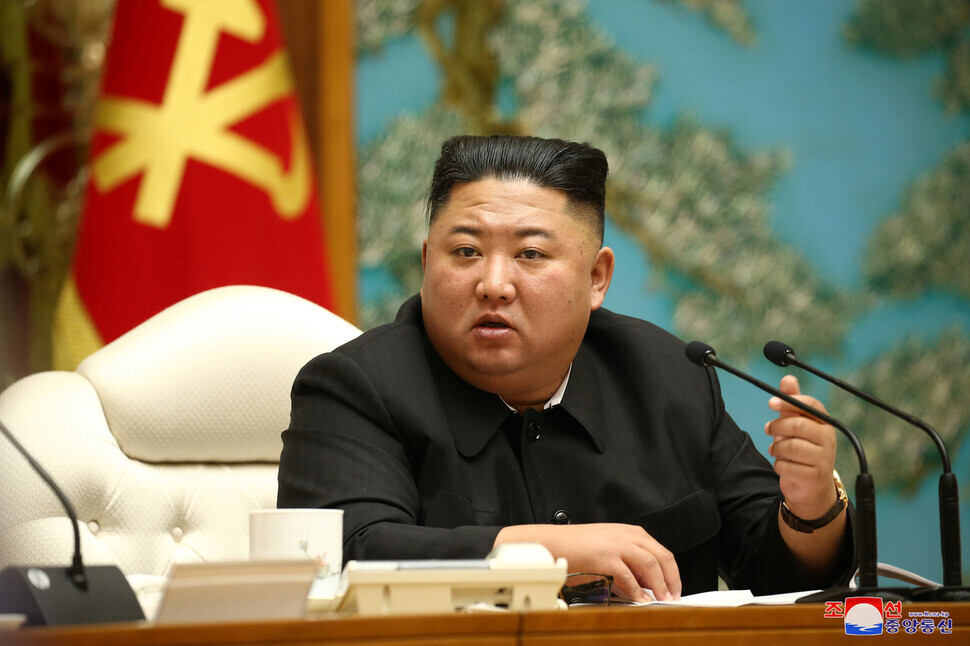hankyoreh
Links to other country sites 다른 나라 사이트 링크
Kim Jong-un declares “80-day campaign” for economic success at WPK Congress

North Korean leader Kim Jong-un plans to wage an “80-day campaign” to achieve 2020 economic goals ahead of an 8th Workers’ Party of Korea (WPK) Congress scheduled for early next year, the Rodong Sinmun newspaper reported in a front-page story on Oct. 6. The plans appear to represent a last-ditch strategy for a regime facing the “triple disaster” of sanctions, COVID-19, and widespread flood damage.
On Oct. 5, Kim held a 19th meeting of the WPK Central Committee Political Bureau at the party’s headquarters, where he “made a responsible and crucial decision to wage an 80-day Campaign” through the end of the year, the Rodong Sinmun reported.
The meeting, which was presided over by Kim, “stressed that the remaining days till the Eighth Congress of the Party is the period of year-end struggle and also the last phase of carrying out the five-year strategy for national economic development put forth at the Seventh Congress of the Party, so that the entire Party and the whole country should wage another all-out campaign,” the report continued.
The report mentioned the “unprecedentedly grave trials and difficulties” faced by North Korea this year. Indeed, its triple disaster -- with intensive, long-term sanctions compounded by the closing of national borders since late January amid the COVID-19 pandemic as well as storm and flood damage in August and September -- means that it will not only fail to achieve the targets set for this year, but also face an inevitable decline in its economy. It’s in this context that Kim moved to implement North Korea’s characteristic labor mobilization tactic with a “speed campaign.”
But speed campaigns have also been cited as a major factor undermining North Korea’s economic base, due to the severely negative long-term effects from distorted resource allocation amid the focus on achieving short-term targets. This is why Kim has been reluctant to employ them to date amid his measures for “economic reform.” Since he came to power in 2012, the only “speed campaigns” adopted to date have been consecutive “70-day” and “200-day” campaigns around the time of the 7th WPK Congress on May 6-8, 2016. Yang Moon-soo, a professor at the University of North Korean Studies and expert on the North Korean economy, explained, “It’s a decision that is realistically unlikely to yield economic results.”
“This comes across strongly as a decision reflecting political and social considerations in terms of increasing the sense of social urgency ahead of the party Congress,” he suggested.
The Rodong Sinmun also reported Kim had conferred the “title of the Marshal of the Korean People's Army (KPA)” on WPK Central Military Commission Vice Chairman Ri Pyong-chol and KPA Chief of General Staff Pak Jong-chon and requested that they “live up to the deep trust and expectations of the Party and the people with great successes in their jobs.” The “KPA Marshal” title is seen as heavily symbolic, with just five recipients to date, including O Jin-u and Choe Kwang. Its conferment on Ri and Pak is being seen as a measure to boost the morale of the KPA -- which has been mobilized for flood damage recovery efforts -- by encouraging the “strengthening of autonomous defense capabilities.”
By Lee Je-hun, senior staff writer
Please direct comments or questions to [english@hani.co.kr]

Editorial・opinion
![[Editorial] Penalties for airing allegations against Korea’s first lady endanger free press [Editorial] Penalties for airing allegations against Korea’s first lady endanger free press](https://flexible.img.hani.co.kr/flexible/normal/500/300/imgdb/original/2024/0502/1817146398095106.jpg) [Editorial] Penalties for airing allegations against Korea’s first lady endanger free press
[Editorial] Penalties for airing allegations against Korea’s first lady endanger free press![[Editorial] Yoon must halt procurement of SM-3 interceptor missiles [Editorial] Yoon must halt procurement of SM-3 interceptor missiles](https://flexible.img.hani.co.kr/flexible/normal/500/300/imgdb/child/2024/0501/17145495551605_1717145495195344.jpg) [Editorial] Yoon must halt procurement of SM-3 interceptor missiles
[Editorial] Yoon must halt procurement of SM-3 interceptor missiles- [Guest essay] Maybe Korea’s rapid population decline is an opportunity, not a crisis
- [Column] Can Yoon steer diplomacy with Russia, China back on track?
- [Column] Season 2 of special prosecutor probe may be coming to Korea soon
- [Column] Park Geun-hye déjà vu in Yoon Suk-yeol
- [Editorial] New weight of N. Korea’s nuclear threats makes dialogue all the more urgent
- [Guest essay] The real reason Korea’s new right wants to dub Rhee a founding father
- [Column] ‘Choson’: Is it time we start referring to N. Korea in its own terms?
- [Editorial] Japan’s rewriting of history with Korea has gone too far
Most viewed articles
- 1Months and months of overdue wages are pushing migrant workers in Korea into debt
- 2[Editorial] Penalties for airing allegations against Korea’s first lady endanger free press
- 3Trump asks why US would defend Korea, hints at hiking Seoul’s defense cost burden
- 4Bills for Itaewon crush inquiry, special counsel probe into Marine’s death pass National Assembly
- 560% of young Koreans see no need to have kids after marriage
- 6Korean firms cut costs, work overtime amid global economic uncertainties
- 7[Guest essay] Maybe Korea’s rapid population decline is an opportunity, not a crisis
- 81 in 3 S. Korean security experts support nuclear armament, CSIS finds
- 9S. Korea discusses participation in defense development with AUKUS alliance
- 10[Reporter’s notebook] In Min’s world, she’s the artist — and NewJeans is her art